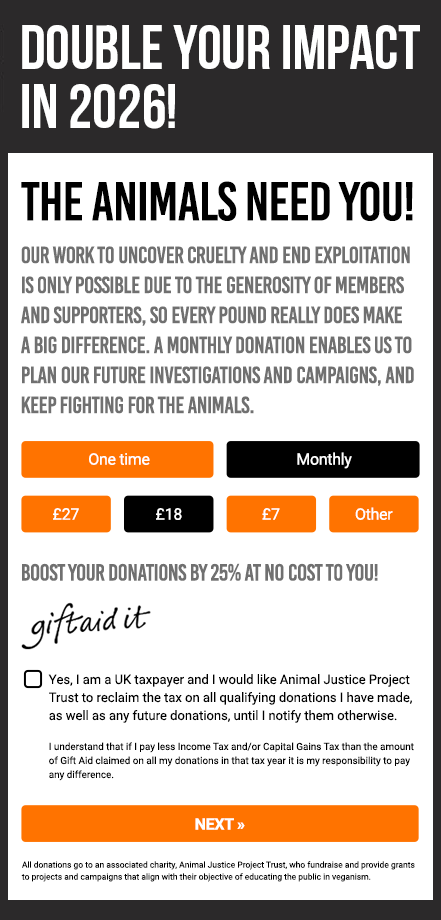
Veganism
Do vegans eat honey?

Blog written by Claire Hamlett, a freelance journalist and contributor
When it comes to food, the rules of being vegan are pretty clear: don’t consume animal products. But confusion seems to linger over whether honey is or isn’t vegan, since bees are not farmed in the same way as other animals and aren’t sent to slaughter. Much of this confusion stems from misconceptions about why bees make honey, how it’s produced, and what impact this has on free-living bee species. But commercial honey production is far from the benign practice some imagine it to be.
Why do bees make honey?
There are around 20,000 species of bee around the world, but the vast majority don’t actually make honey. Those that do – namely honeybees, of which there are many species – make it for the benefit of their colonies. As they don’t hibernate in the winter like many other bees, they need a source of sustenance to see them through the colder months.
Worker bees collect nectar from flowers and carry it back to the hive to turn it into honey. While the nectar meets their nutritional needs in the summer, once plants stop flowering for the year, the bees depend on the honey they have stored in the hive to feed themselves and their young when they hatch from the brood cells inside the hive. So bees make honey for their colony’s survival, but because they can produce more than they need, beekeepers would argue that there is no harm in taking the surplus honey for human consumption. However, there is far more to it than simply taking what the bees don’t use.

How is commercial honey produced?
Honey is big business. The global honey market is worth more than US$8 billion and is expected to grow further as sugar and artificial sweeteners lose their appeal among more health-conscious consumers. While hobbyist beekeepers may only have one or two hives, commercial keepers can have a few hundred.
To produce enough honey to meet demand, honeybees used by many commercial beekeepers are bred to be more productive. This selective breeding results in less diverse genetics and an increased susceptibility to disease.
Many commercial beekeepers will also maximise the amount of honey harvested from hives by removing more honey than just the ‘surplus’ and replacing it with a sugar substitute. This is a further risk to the bees’ health since honey contains many nutrients that they can’t get from sugar. Indeed, nutritional deficiencies caused by bees consuming corn syrup instead of honey turned out to be a likely culprit behind colony collapse disorder, the sudden disappearance of worker bees from a hive that was plaguing commercial beekeepers in the noughties.
Honeybee hives are moved around a lot, usually in the back of trucks, to provide pollination services for agriculture. All this travel causes stress to the bees and can result in many bees in a colony dying. It also spreads diseases to other bees, including free-living ones. Among the diseases that have spilled over from farmed honeybees to wild species like bumblebees are deformed wing virus and exotic fungal pathogens.
Though bees aren’t slaughtered for their meat like other farmed animals, entire hives might be culled to improve productivity to save money, while “lower-quality” queens might be culled to improve the reproduction in the hive.

Impact on free-living bees
Pollinating insect communities are struggling in many parts of the world due to loss of habitat and use of pesticides in industrial agriculture. In the UK, a third of free-living bees and hoverflies are in decline. Some environmental initiatives and the beekeeping industry promote the idea that keeping honeybees can help to reverse the decline in pollinators, but this is false. There is also a misconception that die-offs in commercial bee colonies is a conservation issue when it’s actually an agricultural issue, all of which has caused an uptick in backyard beekeeping. As one conservation ecologist puts it, “It’s the equivalent of farming chickens to save wild birds.”
Increasing the number of honeybees only makes it harder for other bee species to survive. They compete for food sources and spread diseases when they collect pollen and nectar from the same flowers as free-living bees. Honeybees also do not interact with flowers in the same way as other bee species. They are great at collecting pollen to bring back to their hives, but that means they don’t transfer much of it to flowers that they visit, making them less efficient pollinators than many free-living bee species. This means that some species of plants also suffer from a lack of bee diversity as they have evolved with certain kinds of bees to pollinate them. Many places, including parts of England such as London, now have many more honeybee colonies than the local ecosystem can support while also supporting other bee species.
Experts recommend that if people want to help boost wild bee communities, growing native flowers, avoiding pesticides, and providing nesting sites are more effective than keeping honeybees.

Vegan alternatives to honey
Farming bees isn’t just a matter of letting them do what they do and quietly taking the surplus honey from their hives. It exploits the labour of the bees, and in larger commercial operations in particular this is often to their detriment. Bees need their honey for their health, but humans can do without it. In addition, consumers who think they are buying real honey are often being duped, with almost half of honey products tested by the European Commission having been found to be mixed with cheap sugar syrup. Good alternatives include maple syrup, agave syrup and molasses. There are even some ‘bee-free’ vegan honeys starting to come on the market. Eating honey never has been vegan and never will be. We must help our bee friends as much as we can and that does not involve taking away their honey.
As always,
For the animals.

.png)


.png)



%20(2).webp)









.png)